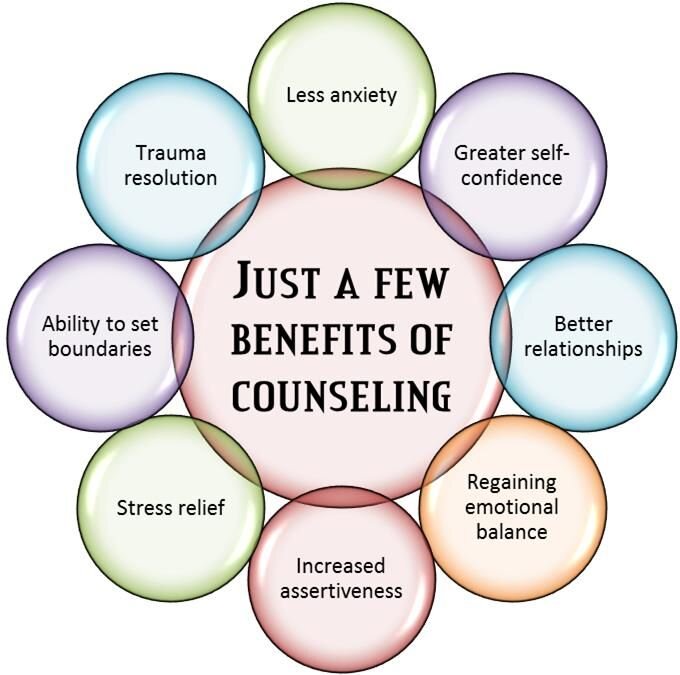Unlocking the Secrets of Mental Health: A Summary of Counseling and Treatment Choices
Psychological health is a facility and important element of general well-being. Countless counseling and treatment options exist to address different psychological challenges. Each method provides one-of-a-kind advantages and approaches tailored to private demands. Recognizing these options is vital for any individual seeking to enhance their psychological wellness. Couples Therapy. What aspects should one think about when checking out these avenues? The solution might reveal a course to a much healthier emotional state
Comprehending Mental Wellness and Its Relevance
Mental health and wellness encompasses the emotional, mental, and social wellness of individuals, substantially affecting just how they believe, really feel, and act. Its value can not be overstated, as it influences every facet of life, including partnerships, work efficiency, and overall quality of life. People with good mental health and wellness often tend to cope with stress and anxiety a lot more properly, maintain healthier relationships, and make educated decisions. Conversely, poor mental health can cause emotional distress, impaired functioning, and different mental illness, which might call for professional treatment. Understanding mental health is important for acknowledging the signs of distress and the demand for assistance. Understanding likewise promotes compassion and decreases stigma, motivating people to seek assistance when essential. By prioritizing psychological health, neighborhoods can foster environments that support emotional well-being, inevitably leading to healthier, much more resilient people. This structure functions as a critical step towards efficient psychological wellness therapy and therapy options.
Sorts Of Therapy Techniques
Counseling strategies vary widely, each tailored to satisfy the unique requirements of people looking for assistance. Among one of the most usual kinds are cognitive-behavioral therapy (CBT), which concentrates on recognizing and transforming unfavorable idea patterns, and person-centered treatment, which stresses empathy and acceptance. Psychodynamic treatment checks out previous experiences and subconscious processes to recognize present behavior, while solution-focused brief treatment intends to determine solutions rather than investigate problems.Additionally, family members treatment addresses relational dynamics and interaction within families, fostering healthier communications. Group counseling gives a public room for participants to share experiences and sustain one an additional. Other techniques consist of existential therapy, which urges individuals to locate meaning and function, and art or music treatment, which makes use of creative expression as a therapeutic device. Each strategy provides distinct strategies and approaches, allowing clients to locate the most appropriate technique for their personal growth and healing journeys.
Exploring Different Therapy Modalities
In the domain name of psychological health counseling, different treatment methods offer distinct techniques to therapy. Cognitive Behavior modification highlights the connection in between habits and ideas, while Psychodynamic Treatment explores subconscious influences on emotional health. In Addition, Mindfulness-Based Techniques promote present-moment recognition as a method to enhance psychological regulation and overall psychological health.
Cognitive Behavior Therapy
Cognitive Behavior Therapy (CBT) sticks out as one of one of the most commonly exercised and looked into modalities in psychological health therapy. This approach concentrates on the interconnection in between feelings, behaviors, and thoughts, highlighting that modifying negative thought patterns can bring about enhanced psychological wellness and behavioral modifications. CBT is structured, normally including a minimal number of sessions, and intends to furnish individuals with useful abilities to manage their signs and symptoms. It is efficient for a range of conditions, consisting of anxiety problems, clinical depression, and trauma. By using methods such as cognitive restructuring and exposure therapy, CBT promotes strength and encourages clients to face challenges head-on, making it a valuable alternative in the landscape of psychological wellness treatments.
Psychodynamic Therapy Approaches
Psychodynamic treatment techniques supply a deep expedition of the unconscious mind and its impact on behavior and psychological well-being. Rooted in Freudian concept, these approaches highlight the significance of very early childhood years experiences and subconscious conflicts. With strategies such as totally free association, desire evaluation, and transference, individuals acquire understanding into their sensations and thoughts, fostering self-awareness and understanding. This healing modality encourages customers to reveal repressed emotions and unresolved problems, which can be pivotal in attending to current psychological obstacles. By taking a look at the interaction between present behaviors and past experiences, psychodynamic treatment aims to advertise emotional recovery and personal growth. Ultimately, it provides a framework for individuals to discover intricate inner characteristics that influence their psychological health.

Mindfulness-Based Strategies
While traditional treatments commonly concentrate on previous experiences, mindfulness-based strategies prioritize present-moment understanding as a pathway to emotional wellness. These methods, including mindfulness-based cognitive therapy (MBCT) and mindfulness-based stress decrease (MBSR), motivate people to engage completely with their thoughts and feelings without judgment. Practitioners find out to observe their mindsets, fostering a better understanding of psychological triggers and feedbacks. This technique not only alleviates symptoms of stress and anxiety and clinical depression yet also enhances overall mental resilience. By integrating mindfulness workouts, such as meditation and deep breathing, clients cultivate a sense of peace and quality. Inevitably, mindfulness-based methods encourage people to navigate life's challenges with increased understanding and approval, promoting a healthier relationship with their emotions and thoughts.
The Duty of a Specialist or Counselor
A proficient therapist or therapist plays an essential duty in supporting people through their mental health and wellness trips. They supply a safe, non-judgmental area where customers can share their thoughts and feelings openly. Cognitive Behavioural Therapy. By utilizing various restorative methods customized per individual's needs, specialists aid customers discover underlying problems that may add to their psychological health challenges.Therapists use advice and devices to deal with anxiety, anxiety, depression, and other psychological problems. Their training furnishes them to acknowledge patterns in habits and assumed procedures, helping with understandings that result in personal development. They likewise foster a solid restorative partnership, which is crucial for successful outcomes.Moreover, specialists remain fully commited to discretion and ethical requirements, making sure a trusting setting. Inevitably, the function of a therapist or counselor is to encourage people, urging them to develop resilience and healthier coping approaches while steering with life's complexities
How to Select the Right Counseling or Treatment Alternative
Choosing the right therapy or therapy alternative starts with examining individual demands. It is important to understand individual challenges and objectives before exploring various treatment styles. This foundational step can significantly influence the performance of the picked approach.
Analyze Your Needs
How can individuals effectively evaluate their psychological wellness requires when reviewing counseling or treatment choices? They need to show on their emotional state and identify certain issues, such as connection, clinical depression, or stress and anxiety obstacles. Journaling can be a useful tool for tracking more tips here ideas and sensations in time. Furthermore, people may take advantage of looking for responses from trusted pals or family participants pertaining to viewed modifications in habits or mood. It is additionally handy to evaluate individual objectives for therapy, such as improving coping skills or acquiring insight into individual patterns. Finally, looking into different counseling methods and their viability for Read Full Report details demands can aid in making an educated option. Ultimately, self-awareness plays a pivotal role in choosing the appropriate course for psychological wellness support.
Discover Treatment Styles
While going across the diverse landscape of therapy choices, people should take into consideration different styles of counseling to find the very best fit for their unique demands. Cognitive Behavioral Therapy (CBT) concentrates on altering adverse thought patterns, while Psychodynamic Treatment explores unconscious processes and previous experiences. Humanistic techniques stress individual growth and self-actualization, fostering an encouraging setting. Additionally, mindfulness-based treatments cultivate present-moment awareness, helping psychological law. For those looking for framework, Solution-Focused Quick Therapy targets certain goals and remedies. Group therapy provides a communal setting for common experiences and assistance. Eventually, individuals should assess their preferences, convenience degrees, and certain difficulties, guaranteeing they choose a restorative style that reverberates with their personal journey toward mental wellness.
Getting Rid Of Obstacles to Seeking Help

The Advantages of Therapy and Treatment for Psychological Wellness
Looking for aid for mental health difficulties can cause considerable improvements in general well-being. Counseling and treatment give individuals with a secure area to discover their feelings and ideas, promoting self-awareness and individual growth. These expert services equip clients with dealing methods and analytic abilities customized to their one-of-a-kind situations.Moreover, therapy can minimize signs and try these out symptoms of stress and anxiety, clinical depression, and other psychological health conditions, improving psychological resilience. Normal sessions advertise liability and urge individuals to establish and accomplish individual objectives. Through different healing methods, such as cognitive-behavioral treatment or mindfulness practices, clients discover to reframe unfavorable thoughts and create healthier behaviors.Additionally, the therapeutic partnership itself can be a source of assistance, assisting to fight seclusion and loneliness. Generally, taking part in therapy and treatment is an aggressive step toward achieving psychological health, enabling people to lead even more fulfilling lives.
Often Asked Inquiries
How Long Does Therapy or Treatment Commonly Last?
The period of therapy or treatment varies substantially, typically lasting from a few sessions to a number of months or years. Factors influencing this consist of the individual's specific demands, the kind of therapy, and restorative goals.
What Should I Anticipate Throughout My Initial Session?
Throughout the first session, people can expect an introduction, discussion of problems, and the specialist's approach. They may complete evaluations and develop goals, cultivating a secure atmosphere for open interaction and building relationship.

Are There Any Threats Associated With Therapy?
Therapy can include dangers, such as emotional pain, vulnerability, or challenging unpleasant memories. While these obstacles might emerge, they can likewise bring about individual growth and recovery, making the healing process complex yet possibly satisfying.
How Can I Tell if My Therapist Is a Good Fit?
Identifying if a therapist is a good fit includes evaluating comfort, interaction style, and restorative technique. Positive connection and progression towards objectives are indications of an appropriate suit, necessary for efficient psychological health assistance.
Will My Insurance Cover Counseling or Treatment Sessions?
Identifying insurance coverage for counseling or therapy sessions usually requires speaking to the insurance coverage copyright straight. Policies differ significantly, so people ought to confirm advantages, co-pays, and any type of needed pre-approvals before pursuing treatment solutions. Amongst the most usual kinds are cognitive-behavioral therapy (CBT), which focuses on recognizing and transforming unfavorable thought patterns, and person-centered treatment, which emphasizes empathy and acceptance. Psychodynamic treatment discovers past experiences and subconscious procedures to comprehend existing actions, while solution-focused short treatment intends to recognize remedies rather than examine problems.Additionally, family therapy addresses relational characteristics and communication within families, cultivating healthier communications. Other strategies include existential treatment, which encourages people to discover definition and objective, and art or songs treatment, which utilizes creative expression as a therapeutic device. Cognitive Behavior Therapy highlights the link in between thoughts and behaviors, while Psychodynamic Therapy explores unconscious impacts on emotional wellness. Cognitive Behavioral Treatment (CBT) focuses on changing adverse idea patterns, while Psychodynamic Therapy checks out previous experiences and unconscious procedures.